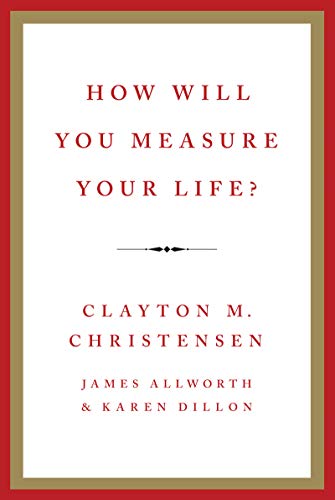How Will You Measure Your Life? Link to heading
Summary: Link to heading
“How Will You Measure Your Life?” is a thought-provoking book authored by Clayton M. Christensen, along with James Allworth and Karen Dillon. The book is grounded in Christensen’s earlier work on disruptive innovation but extends these principles to personal life and career decisions. It presents a framework for achieving a fulfilling career, nurturing relationships, and maintaining personal integrity. The authors employ business theories to explore life’s toughest questions, providing insights into how people can use the principles of innovation and strategic decision-making to guide their personal and professional lives. The narrative integrates stories from business and personal experiences, making the theoretical aspects more relatable and practical.
Review: Link to heading
The book has been well-received for its unique approach to blending business theories with personal development topics. One of its strengths lies in how it translates complex concepts into actionable advice that applies to everyday life. Christensen’s personal stories, shared with humility and insight, enrich the narrative and make it deeply relatable. However, some critiques suggest that while the integration of business concepts into personal life decisions is intriguing, certain readers may find the transition between professional theories and personal life lessons to be somewhat stretched. Nonetheless, the book’s introspective questions and applied thinking provide a meaningful guide for those seeking clarity on what truly matters.
Key Takeaways: Link to heading
Purpose-Driven Life: Create a personal strategy for your life just as companies create a strategy for their future. Determine your purpose and align your time and resources accordingly.
Allocation of Resources: Where you choose to invest your time, energy, and talent demonstrates what you really want in life. Consistent reflection on these choices is crucial.
Balancing Priorities: Maintaining healthy relationships and personal integrity should be as much a priority as career success. Long-term satisfaction relies on balance rather than business achievements alone.
The Power of Values: Establishing clear values at the outset of life choices can prevent compromise in both small and significant decisions, leading to sustained personal success.
Avoiding the “Marginal Cost” Mistake: Christensen warns against justifying compromises by considering only the short-term benefits rather than the long-term costs.
Recommendation: Link to heading
“How Will You Measure Your Life?” is particularly valuable for professionals at any stage of their careers who are seeking deeper satisfaction and purpose in their personal and professional lives. It is also beneficial for individuals contemplating major life decisions or those striving to align their daily choices with their core values. The blend of business acumen and personal wisdom makes it an enlightening read for anyone interested in personal development, offering not only introspection but practical strategies for leading a meaningful life.
